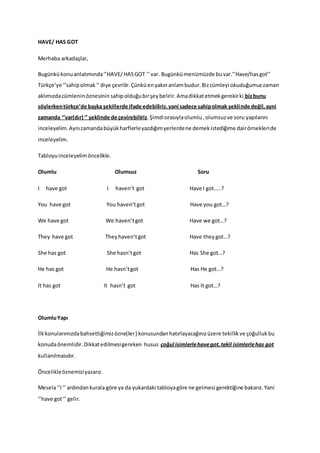
Have got konu anlatımı
- 1. HAVE/ HAS GOT Merhaba arkadaşlar, Bugünkü konu anlatımında ‘’HAVE/ HAS GOT ‘’ var. Bugünkü menümüzde bu var.’’Have/has got’’ Türkçe’ye ‘’sahip olmak ‘’ diye çevrilir. Çünkü en yakın anlam budur. Biz cümleyi okuduğumuz zaman aklımızda cümlenin öznesinin sahip olduğu bir şey belirir. Ama dikkat etmek gerekir ki biz bunu söylerken türkçe’de başka şekillerde ifade edebiliriz. yani sadece sahip olmak şeklinde değil, ayni zamanda ‘’var(dır) ‘’ şeklinde de çevirebiliriz. Şimdi sırasıyla olumlu , olumsuz ve soru yapılarını inceleyelim. Aynı zamanda büyük harflerle yazdığım yerlerde ne demek istediğime dair örnekleri de inceleyelim. Tabloyu inceleyelim öncelikle. Olumlu I have got Olumsuz I haven’t got Soru Have I got…..? You have got You haven’t got Have you got…? We have got We haven’t got Have we got…? They have got They haven’t got Have they got…? She has got She hasn’t got Has She got…? He has got He hasn’t got Has He got…? It has got It hasn’t got Has It got…? Olumlu Yapı İlk konularımızda bahsettiğimiz özne(ler ) konusundan hatırlayacağınız üzere tekillik ve çoğulluk bu konuda önemlidir. Dikkat edilmesi gereken husus çoğul isimlerle have got, tekil isimlerle has got kullanılmasıdır. Öncelikle öznemizi yazarız. Mesela ‘’I ‘’ ardından kurala göre ya da yukardaki tabloya göre ne gelmesi gerektiğine bakarız. Yani ‘’have got ‘’ gelir.
- 2. I have got şeklinde yazdıktan sonra bir isim getiririz. Mesela ‘’ a car’’. Cümle son haliyle; ‘’I have got a car’’ şeklinde oldu.Çevirirken ise ‘’Ben bir arabaya sahibim ‘’şeklinde olabilir ama ‘’ Benim bir arabam var ‘’ dersek anlatım olarak daha şık durur. Yukarda bahsettiğimiz ‘’sahibim’’ ye rine ‘’var’’ demek işte bu anlamda işe yaramaktadır. Örneklere devam edelim. Bu sefer ise ‘’He’’ öznesini ele alalım. Öznemiz 3. Tekil şahıs olduğu için bu sefer ‘’has got ‘’ getirmemiz gerekir. ‘’He has got …….’’ şeklinde. Son olarak ise neyi olduğu ya d a neye sahip olduğunu belirtmek için bir isim koyalım. Örneğin bir bilgisayar demek için ‘’a computer’’. Son hali olarak ‘’He has got a computer.’’ İşte bu kadar. Yalnız dikkat edelim , önceki yazılarımızda dediğimiz gibi özneler her zaman ‘’I, you, he, she…..’’ şeklinde kullanılmaz. Onlara karşılık gelen isimler de kullanılır. Dolayısıyla hangi ismin hangi zamire geldiğini iyi anlamak gerekir. Mesela; ‘’Ayşe ‘’ öznesi zamir olarak ‘’she ‘’olduğu için ‘’has got ‘’ dememiz gerekir.Yani Ayşe( She) has got a baby. Ardından ‘’Tarkan ‘’ öznesi mesela. Tarkan ( he ) has got a mobile phone. Yine devam edelim. Öznemiz ‘’The world’’ olsun. The world( it ) has got a satellite. Yukarıdaki noktalara dikkat ederseniz , yani mantığını anlayabilirseniz işiniz çok kolay. Tüm mesele özel ya da cins isimlerin hangi zamire karşılık geldiğini bulmak. Örnek kalıpları: I have got………………. You have got…………….. We ( I and my friend ) have got……………….. They ( Serkan and Selma ) have got………………………. You ( You and your mother ) have got……………………. Sibel ( She ) has got……………………….. Selim ( He ) has got……………………….
- 3. A lion ( it ) has got………………… Nokta nokta ile belirtilen yerlere sahip olunan ya da vardır diyebileceğimiz bir isim veya isimler koyabilirz. ‘’ a book , a bag, an apple, a car, a house , an athletic body, blonde hair, long hair, blue eyes etc….’’ gibi. My sister and I have got a puppy. ( Kız kardeşim ve Ben yavru bir köpeğe sahibiz. / Kız kardeşim ve Benim yavru köpeğimiz var.) Olumsuz yapı Olumsuz yapıda ise have-haven’t , has-hasn’t şeklinde kullanılmaktadır. Tek yapmanız gereken ‘’ n’t ‘’ getirmek. Uzun yazılış ile have ve has ‘den sonra ‘’not ‘’ getirmek. Bu kadar basit. Örnek kalıpları: I haven’t got………………. You haven’t got…………….. We ( I and my friend ) haven’t got……………….. They ( Serkan and Selma ) haven’t got………………………. You ( You and your mother ) haven’t got……………………. Sibel ( She ) hasn’t got……………………….. Selim ( He ) hasn’t got………………………. A lion ( it ) hasn’t got………………… Aynı şekilde nokta nokta yazılan yerlere bir ya da birden fazla eşya nesne ismi yazabiliriz. Ahmet hasn’t got an expensive car. ( Ahmet pahalı bir arabaya sahip değil. / Amet’in pahalı bir arabası yok.) Soru Yapısı Bu yapıda ise ‘’have , has ‘’ cümle başına gelir. Gerisi aynen yazılır. İşte oldu , bu kadar.
- 4. Have I got………………? Have you got……………..? Have We ( I and my friend ) got………………..? Have They ( Serkan and Selma ) got……………………….? Have You ( You and your mother ) got…………………….? Has Sibel ( She ) got………………………..? Has ( He ) got……………………….? Has A lion ( it ) got…………………? Evet gördüğümüz gibi ‘’have , has ‘’ özne ile yer değiştirmiştir. Önceki yazılanlarda bahseldiği gibi soru cümlesi yapmak için 1. Öğe ile 2. Öğenin yer değiştirmesi gerekiyordu.Burda da aynısı olmuştur. Have they got a son? ( Onlar bir erkek evlada sahip mi? / Onların bir erkek evlatları var mı?) Cevap veriken de yine soru yapmak için yer değiştiren özne ile have,has ‘’ tekrar eski yerine yazılır. Have I got…………………? Yes , I have got / No, I haven’t got. Have you got………….? Yes , I have got ./ No, I haven’t got. ( ‘’Sen ‘’ ile soru ‘’ Ben ‘’ ile cevap kuralından ötürü you öznesine I ile cevap verilmiştir. ) Have we got ……………..….? Yes , we have got ./ No, we haven’t got. Have they got ………………? Yes, they have got. / No, they haven’t got. Has Beyza (she) got………..? Yes, she has got. / No, She hasn’t got. Has Ahmet ( he ) got………? Yes, he has got. / No, he hasn’t got. Has A dog ( It) got…………..? Yes, it has got. No, it hasn’t got.
